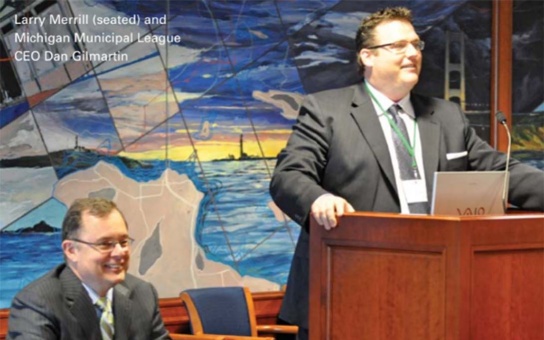
It's been eight years since the Ford School launched the Michigan Public Policy Survey, which collects data and opinions about a broad range of state and local policy challenges from local government leaders across the state. After 16 surveys, 60 reports, and more than 1,000 media mentions, we look back at the origins of the survey, and the partnerships that have been so critical to its success.
They could have seen the survey as a threat
Larry Merrill, executive director of the Michigan Townships Association (MTA), remembers his first introduction to the Michigan Public Policy Survey.
Tom Ivacko (MPA '93) and Debra Horner visited him at the MTA offices in Lansing to describe the vision: To collect data and opinions on a broad range of state and local policy challenges by surveying the chief elected and appointed officials of every jurisdiction in the state—small townships with a few hundred citizens, sprawling cities with hundreds of thousands, and everything in between.
"They were seeking our buy in as a partner," says Merrill, "to help generate questions and provide some guidance on how to frame them."
Ivacko, program manager at the Center for Local, State, and Urban Policy (CLOSUP), will never forget Merrill's response. "We said, here's what we're thinking of doing, and they welcomed us with open arms," says Ivacko.
Fortunately, it was a response shared by the Michigan Municipal League and the Michigan Association of Counties, as well. "They could have seen [the survey] as a threat—that we would be collecting data that might make their jobs harder—but they saw it as an opportunity, instead," Ivacko says. "I feel so grateful."
With buy-in from "the M's"
To CLOSUP, those partnerships weren't just niceties; they were critical to the survey's success. "We wanted to be sure local leaders would take the time to complete the survey, that the survey would be relevant to them, and that it would be relevant to state leaders, too," says Ivacko. "We also wanted to ensure the data and findings would be valued on the back end—that state and local leaders would use the data in their work."
With buy-in from "the M's"—CLOSUP shorthand for the survey's Michigan association partners—CLOSUP launched its first MPPS in the spring of 2009. For that survey, and for each survey since, CLOSUP staff outlined topics that might merit investigation, then contacted the M's to collect their experiences, reflections, and ideas about each. When CLOSUP staff drafted questions, they shared those, as well. "Sometimes we'd hear about important aspects of the issue that we were missing, or response options to include, or suggestions on wording," says Ivacko.
Today, the MPPS is recognized as the only policy survey of its kind—one that takes a census approach, including every unit of general purpose local government across an entire state. And response rates of 71 percent, on average (73 percent in recent years), indicate that Michigan's local leaders have indeed found the survey relevant.
A feedback loop and finger on the pulse
Barry Rabe, director of CLOSUP, sees the survey as a hallmark example of what a great, public university like Michigan can do for its state.
"The relationship between state and local government is so important for effective governance, but it's so hard to do well," he says, noting that states with strained relations are all across the nation and are contending with dozens of complex policy challenges including fracking, transportation, and public education.
"In these and other areas, it's often hard to understand what local governments need and want," he continues, "but the MPPS provides a kind of feedback loop, a finger on the pulse of what local jurisdictions are thinking about the most critical policy issues of the time and region."
The issue is there in black and white

Larry Merrill notes that participation in the survey has benefitted his association, as well.
When local leaders hear about issues from constituents, he says, the language and information are often framed by personal and political views. With the Michigan Public Policy Survey, he says, "that color is gone, and [the issue] is there in black and white…with a real sensitivity to and awareness of the issue's complexity."
That objective framing, Merrill believes, has helped local government leaders see issues more clearly, and has helped the association discover shared priorities and emerging trends.
When the MPPS focused on transportation issues, says Merrill, it became apparent that a majority of townships across the state were struggling to contend with necessary road repairs. Data on "dark stores assessing," or the practice of basing retail store property taxes on the value of similar, but abandoned ("dark") buildings, was helpful in conversations with state lawmakers. And longitudinal data on local fiscal government health has convinced Merrill, and many others, that while the state itself has largely recovered from the economic recession, its local governments continue to feel financial strain.
Respect for those serving
Resolving these challenges will take work, bipartisan buy in, and creativity. But valid and unbiased data will help local government leaders and other conscientious public servants make better policy.
"For all of the anger across the country directed at government, I wish people could see all those who are working to make things better," says Ivacko, speaking of the M's and the local government leaders they represent.
"There can always be some bad apples of course, but they're the exception. I have a lot of respect for those serving."
Below is a formatted version of this article from State & Hill, the magazine of the Ford School. View the entire Spring 2017 State & Hill here.